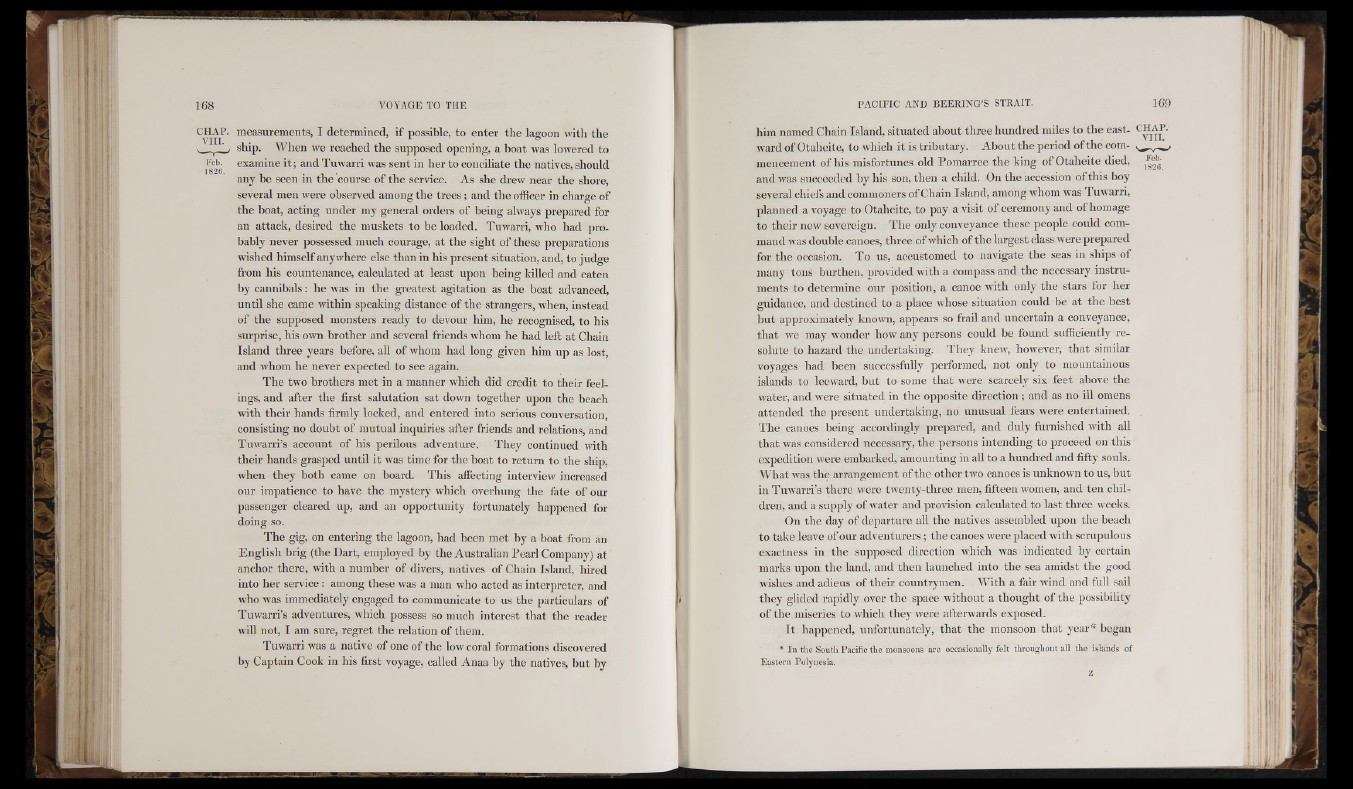
-y y - m m
168 VOYAGE TO THE
CHAP. measurements, I determined, if possible, to enter the lagoon with the
Feb.
1326,
ship. YY"hen we reached the supposed opening, a boat was lowered to
examine it; and Tuwarri was sent in her to conciliate the natives, should
any be seen in the course of the service. As she drew near the shore,
several men were observed among the trees; and the officer in charge of
the boat, acting under my general orders of being always prepared for
an attack, desired the muskets to be loaded. Tuwarri, who had probably
never possessed much courage, at the sight of these preparations
wished himself anywhere else than in his present situation, and, to judge
from his countenance, calculated at least upon being killed and eaten
by cannibals: he was in the greatest agitation as the boat advanced,
until she came within speaking distance of the strangers, when, instead
of the supposed monsters ready to devour him, he recognised, to his
surprise, his own brother and several friends whom he had left at Chain
Island three years before, all of whom had long given him up as lost,
and whom he never expected to see again.
The two brothers met in a manner which did credit to their feelings,
and after the first salutation sat down together upon the beach
with their hands firmly locked, and entered into serious conversation,
consisting no doubt of mutual inquiries after friends and relations, and
Tuwarri’s account of his perilous adventure. They continued with
their hands grasped until it was time for the boat to return to the ship,
when they both came on board. This affecting interview increased
our impatience to have the mystery which overhung the fate of our
passenger cleared up, and an opportunity fortunately happened for
doing so.
The gig, on entering the lagoon, had been met by a boat from an
English brig (the Dart, employed by the Australian Pearl Company) at
anchor there, with a number of divers, natives of Chain Island, hired
into her service : among these was a man who acted as interpreter, and
who was immediately engaged to communicate to us the particulars of
Tuwarri’s adventures, which possess so much interest that the reader
will not, I am sure, regret the relation of them.
Tuwarri was a native of one of the low coral formations discovered
by Captain Cook in his first voyage, called Anaa by the natives, but by
PACIFIC AND BE ER IN G ’S STRAIT. 169
Feb.
1826.
him named Chain Island, situated about three hundred miles to the east-
ward of Otaheite, to which it is tributary. About the period of the commencement
of his misfortunes old Pomarree the king of Otaheite died,
and was succeeded by his son, then a child. On the accession of this boy
several chiefs and commoners of Chain Island, among whom was Tuwarri,
planned a voyage to Otaheite, to pay a visit of ceremony and of homage
to their new sovereign. The only conveyance these people could command
was double canoes, three of which of the largest class were prepared
for the occasion. To us, accustomed to navigate the seas in ships of
many tons burthen, provided with a compass and the necessary instruments
to determine our position, a canoe with only the stars for her
guidance, and destined to a place whose situation could be at the best
but approximately known, appears so frail and uncertain a conveyance,
that we may wonder how any persons could be found sufficiently resolute
to hazard the undertaking. They knew, however, that similar
voyages had been successfully performed, not only to mountainous
islands to leew’ard, but to some that were scarcely six feet above the
water, and were situated in the opposite direction ; and as no ill omens
attended the present undertaking, no unusual fears were entertained.
The canoes being accordingly prepared, and duly furnished with aU
that was considered necessary, the persons intending to proceed on this
expedition were embarked, amounting in all to a hundred and fifty souls.
What was the arrangement of the other two canoes is unknown to us, but
iu Tuwarri’s there were twenty-three men, fifteen women, and ten children,
and a supply of water and provision calculated to last three weeks.
On the day of departure all the natives assembled upon the beach
to take leave of our adventurers ; the canoes were placed with scrupulous
exactness in the supposed direction which was indicated by certain
marks upon the land, and then launched into the sea amidst the good
wishes and adieus of their countrymen. YY’ith a fair wind and full sail
they glided rapidly over the space without a thought of the possibility
of the miseries to wliich they were afterwards exposed.
It happened, unfortunately, that the monsoon that year* began
* In the South Pacific the monsoons are occasional!}* felt throughout all the islands of
Eastern Polynesia. r